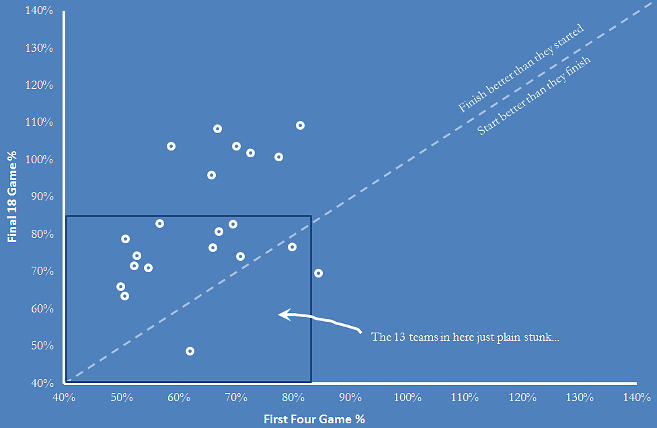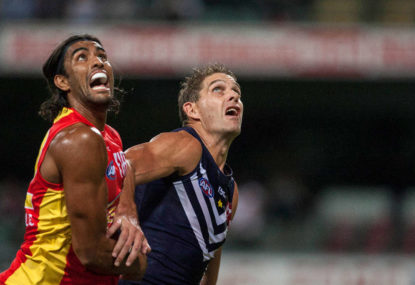Since the turn of the century, 23 teams have started an AFL season with a doughnut after four games, and none of them have gone on to make the finals. The Fremantle Dockers have started the year with a doughnut in 2016 – here’s why they can make history.
Last week, colleague Jay Croucher penned an excellent column eulogising the Fremantle Football Club, following its premature death in the first rounds of 2016; cut down before it hit its prime. Like all of Jay’s writing, it was fun interlaced with some hard hitting home truths.
The Dockers’ 0-4 start to the 2016 season points to serious structural flaws with the playing list and game style of Ross Lyon, and their chances of making it to September this season are negligible, so the broad media narrative of this week goes. A lot of this is centred on the notion that a team that starts the season 0-4 has never made the finals.
Indeed, this is the case. Since the year 2000, there have been 23 instances of a team starting off the year without a victory in their first four games, none of whom made it to September.
An 0-4 start likely reflects that a team is not very good at playing football in the relevant year; the average win total of a team that started the season without a win since the year 2000 is 5.4 – less than half of the win total required to breakeven on the year, let alone make it to the promised land.
Percentage is a better indicator here and indeed, the vast majority of teams that start poorly end poorly, as reflected by their percentage in different segments of the year. However, it is very clear that most sides see their percentage increase over the course of the year, relative to their sluggish starts.

An 0-4 start also means that even if a team is good, the mathematics are stacked against them. In a 22-game season, a club can lose at the very most six of their final 18 games to garner a better-than-0.500 record and a prospective trip to the finals. In most years, though, the price of a finals place is set higher than 12 wins – which further tips the balance against the slow starting team.
Plenty of clubs have gone 12-6 in their final 18 games in the past 16 seasons since the turn of the century. In fact, it has happened 66 times, or more than four times per season – so many that it isn’t worth citing them all here. However, the teams that do win at least 12 of their last 18 games tend to start the season with at least one win from their first four.
So it hasn’t happened. But that doesn’t mean teams haven’t come close. In 2011, North Melbourne started the year 0-4 after five rounds (they had a bye in Round 4), and ended the season ontenwins – one and a half short of finals. That effectively meant the ‘Roos went 10-8 from Round 6 onwards; lifting their percentage from 72.8 in their first four games to 107.5 in the remainder. Indeed, North was seventh on the Round 6 to Round 24 AFL ladder – a fictitious ladder that I just made up that means absolutely nothing, but a ladder no less.
The Western Bulldogs started the season 0-4 in 2002, but went on to win nine and draw one of their last 18 games; the Adelaide Crows finished their final 18 games with a 9-9 split after starting with a doughnut in the 2000 season. It hasn’t happened often, but sides have finished their poor starts with more redeemable performances.
The numbers are stacked against them, but none of this should count Fremantle out out of the finals race on its own. That is lazy, false analysis, that gives no regard to the interesting circumstances that the Dockers find themselves in after four games of the 2016 season.
Shifting styles
Fremantle are an outed revolutionary; a side seeking to cast off the defensive shackles of the past in the hope of a more free-flowing, high-scoring future. We talked about this in the pre-season, and how-is-he-not-captain Nat Fyfe talked about it earlier in the week.
It is working, kind of, so far, with the Dockers scoring 100 points in two of their four outings to date (they scored 100 points six times in 2015). But it has come at the clear expense of Fremantle’s previous strengths: defending clearances and, well, defending full stop.
The Dockers rolled out some elements of their old style of play against North Melbourne in the weekend just passed, with Fremantle adopting a more closed stance at clearances. They almost got the win, too, with a North Melbourne cannon blast (we’re going to have to get used to these happening for the remainder of this season) in the last quarter getting them home.
Fremantle’s around-the-ground defence remained six shades of terrible, though, and they ended up conceding their third score of 100 points or more. They did this three times all of last year.
Coach Ross Lyon has acknowledged the early season failings of his game plan tweaks, and we can expect these to be addressed fully in the weeks ahead. The team and style that the Dockers trotted out in the first month of the season won’t be the same as the team and style that is played in the second half of the year – meaning the 0-4 start and what it suggests won’t be reflective of the team’s abilities when the whips are really cracking.
Difficult draw
Fremantle might have played three of the best four sides in the competition – West Coast, the Western Bulldogs and North Melbourne – in their first four games.
My Simple Rating System, which teases out the draw difficulty a side has faced from their average margin of victory or loss, suggests the Dockers have played the toughest schedule to this point in the season. Fremantle’s four games have been five goals more difficult on average than the rest of the competition, and up totengoals more difficult than some clubs who have had an easier time of it.
These numbers do fluctuate quite wildly in the early stages of the season, but given we’re talking about how Fremantle’s first four might not reflect the rest of their year, it matters.
Home ground advantage
Finally, there is the small matter of home ground advantage. Fremantle’s 2016 home slate now looks like this:
| Round 5 |
Carlton |
| Round 7 |
Greater Western Sydney |
| Round 9 |
Richmond |
| Round 11 |
Essendon |
| Round 13 |
Port Adelaide |
| Round 17 |
Geelong |
| Round 19 |
Sydney |
| Round 20 |
WCE |
| Round 21 |
Adelaide |
| Round 23 |
Western Bulldogs |
|
Even based on their early season of poor form, there are four guaranteed wins there; based on the weekend just gone they’ll give most of those sides a run for their money. In fact, playing the likes of Geelong, Sydney, Adelaide and the Western Bulldogs away from home is certainly preferable to playing them on their own home grounds.
Indeed, Fremantle’s away schedule looks squishy and soft: St Kilda, Brisbane, Collingwood, Melbourne, plus a few mid table teams, the double up on the Crows at Adelaide Oval, and the annual trip down to Tassie to be humiliated by the Hawks (seriously, why is this a thing?).
Fremantle have a lot of problems, and are almost certainly out of the figuring for a top-four spot based on mathematics alone. But counting them out of the finals, particularly if you’re mostly basing your call on the 0-4 rule, is premature at best and lazy at worst.
An 0-5 start, following a loss to an outed rebuilder? Now, that’s a different story.






























































































